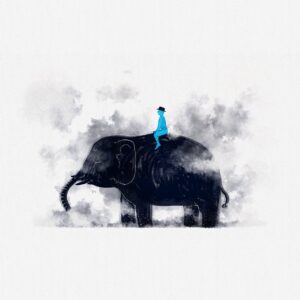La teoría del Desarrollo Psicosocial de Erikson, desarrollada por el renombrado psicólogo Erik Erikson, es un marco conceptual que intenta comprender cómo las personas construyen su personalidad a lo largo de la vida. Esta teoria, conocida como teoría psicosocial de Erik Erikson, plantea que el desarrollo humano está influenciado por una interacción constante entre el individuo y su entorno social.
Según esta teoría, cada persona va construyendo su personalidad a través de un proceso dinámico de interacción con diferentes etapas de sus vidas. Erik Erikson teoría sugiere que estas etapas son características comunes en la vida humana y que durante ellas, las personas deben enfrentar conflictos éticos para desarrollar una madurez emocional.
La Teoría del Desarrollo Psicosocial de Erikson se centra en la idea de que el individuo está constantemente interactuando con su contexto social y cultural, lo que influencia significativamente su crecimiento y desarrollo psicológico. Desarrollo psicosocial de Erikson es un proceso gradual que abarca desde la infancia hasta la vejez, y durante el cual las personas deben superar conflictos éticos para construir una personalidad saludable y estable.
La importancia del desarrollo humano
La teoría del Desarrollo Psicosocial de Erikson nos permite comprender la complejita diálogo entre el individuo y su entorno, lo que es fundamental para construir una personalidad sólida y saludable. Erik erikson teoria sugiere que estos conflictos éticos pueden influir en el desarrollo humano y en la formación de la personalidad, ya que las personas deben aprender a manejarlos a medida que crecen.
En este sentido, La Teoría del Desarrollo Psicosocial, puede ayudarnos a comprender cómo podemos enfrentar y superar estos conflictos éticospara desarrollar una mayor madurez emocional. Por ejemplo, en la etapa infantil, el conflicto ético es la ansiedad versus seguridad social; mientras que en la etapa adulta, se enfoca en el conflicto entre la identidad y la integridad personal.
La Teoría del Desarrollo Psicosocial de Erikson nos permite comprender cómo las interacciones humanas influyen en el desarrollo humano, ya sea a nivel individual o social. Esto tiene importantes implicaciones para nuestro comportamiento, nuestras relaciones y nuestra propia calidad de vida.
Erik Erikson y su teoría del desarrollo
Erik Erikson, un psicólogo estadounidense de origen danés, es conocido por desarrollar la Teoría del Desarrollo Psicosocial, una teoría que intenta comprender cómo las personas construyen su personalidad a lo largo de la vida. Teoría del desarrollo psicosocial de Erikson sugiere que el crecimiento y desarrollo humano son un proceso continuo que influye en la formación de la personalidad.
Erikson se basó en la idea de que las personas construyen su personalidad a través de una interacción constante entre lo individual y lo social. Esto significa que las características del entorno, como la familia, la sociedad y la cultura, influencian significativamente el desarrollo psicológico de las personas.
En esta teoría, Erikson identificó etapas psicosociales de erikson que son comunes en la vida humana. Cada etapa presenta un conflicto ético que la persona debe superar para desarrollar una mayor madurez emocional. Estas etapas transcurren desde la infancia hasta la vejez y durante ellas, las personas deben aprender a manejar los conflictos éticos para construir una personalidad saludable.
La Teoría del Desarrollo Psicosocial de Erikson es una perspectiva importante en el campo de la psicología, ya que nos permite comprender mejor cómo las interacciones humanas influyen en el desarrollo humano.
Las 8 etapas del desarrollo psicosocial
De acuerdo con la Teoría del Desarrollo Psicosocial de Erikson, las personas experimentan ocho etapas del desarrollo psicosocial que abarcan desde la infancia hasta la vejez. Cada una de estas etapas presenta un conflicto ético que la persona debe superar para desarrollar una mayor madurez emocional.
La primera etapa comienza en la infancia, cuando los niños enfrentan el conflicto entre la ansiedad y la seguridad social. En esta etapa, los niños deben aprender a confiar en sus cuidadores y a sentirse seguros en su entorno.
A medida que los niños crecen y se convierten en adolescentes, enfrentan el conflicto entre la identificación con la familia y la búsqueda de la independencia. En esta etapa, los adolescentes deben encontrar un equilibrio entre sostener sus vínculos familiares y explorar su propia identidad.
La tercera etapa se traduce en la adultez temprana, cuando las personas enfrentan el conflicto entre la integridad personal y la ansiedad por aceptación. En esta etapa, los adultos deben aprender a aceptarse a sí mismos y a establecer sus propias identidades.
La cuarta etapa se refiere a la adultez media, cuando las personas enfrentan el conflicto entre la productividad y la creatividad versus la rutina y el aburrimiento. En esta etapa, los adultos deben encontrar hobbies y actividades que les den un sentido de propósito y satisfacción.
La quinta etapa se traduce en la adultez tardía, cuando las personas enfrentan el conflicto entre la aceptación y el rechazo de la propia mortalidad. En esta etapa, los adultos deben aprender a aceptar su propia mortalidad y a encontrar significado en sus vidas.
La sexta etapia se refiere al período de la jubilación, cuando las personas enfrentan el conflicto entre la autonomía y la dependencia. En esta etapa, los adultos deben aprender a adaptarse a una nueva forma de vida y a mantener su sentido de autonomía.
La séptima etapa se traduce en el período de la ancianidad, cuando las personas enfrentan el conflicto entre la aceptación de la propia mortalidad y la búsqueda de la espiritualidad. En esta etapa, los adultos deben aprender a encontrar significado y propsito en sus vidas.
La última etapa se refiere al período final de la vida, cuando las personas enfrentan el conflicto entre la integridad personal y la aceptación de la propia mortalidad. En esta etapa, los adultos deben aprender a aceptar su legado y a dejar un impacto positivo en aquellos que les siguen.
Infante (0-1)
Infancia (0-1): La primera etapa del desarrollo psicosocial según Erik Erikson es la de la infancia, que abarca desde el nacimiento hasta los 18 meses aproximadamente.
Durante esta etapa, los bebés deben superar un conflicto ético fundamental entre la ansiedad y la seguridad social. Esta ansiedad se refiere a la inseguridad y la incertidumbre que experimentan los bebés, mientras que la seguridad social se traduce en la confianza que sienten cuando están rodeados de figuras cuidadoras, como padres o madres.
La resolución positiva de este conflicto ético puede llevar a un sentimiento de seguridad y confianza en el entorno, lo que es fundamental para el desarrollo psicosocial posterior. Por otro lado, la no resolución o la resolución negativa pueden dar lugar a una personalidad más insegura y ansiosa.
Características clave de esta etapa:
- La infancia es un período de gran dependencia y necesidad de cuidado por parte de los bebés.
- Los bebés comienzan a desarrollar habilidades y patrones de comportamiento, como el llanto o la risa, para comunicarse con sus cuidadores.
- La interacción cara-a-cara con los padres o cuidadores es fundamental para la regulación emocional y la formación de lazos afectivos.
Conseguir resultados positivos en esta etapa puede influir en el desarrollo posterior y en la personalidad adulta.
Toddler (1-3)
Edad infantil o Toddler (1-3): La segunda etapa del desarrollo psicosocial según Erik Erikson es la de la edad infantil, que abarca desde los 18 meses hasta aproximadamente los 3 años.
Durante esta etapa, los niños enfrentan el conflicto entre la identificación con la figura parental y la exploración del otro. Esta etapa es importante porque los niños comienzan a explorar su entorno y a desarrollar una identidad propia, mientras que aún dependen de sus cuidadores para la supervivencia.
La resolución positiva de este conflicto ético puede llevar a un sentimiento de seguridad en la relación parental y a la capacidad para explorar y aprender sobre el mundo. Por otro lado, la no resolución o la resolución negativa pueden dar lugar a una personalidad más dependiente o insegura.
Características clave de esta etapa:
- La edad infantil es un período de gran exploración y aprendizaje.
- Los niños comienzan a desenvolvimiento habilidades físicas, como caminar o hablar, y suentendense más sobre el mundo que los rodea.
- La interacción cara-a-cara con los padres o cuidadores sigue siendo fundamental para la regulación emocional y la formación de lazos afectivos.
Conseguir resultados positivos en esta etapa puede influir en el desarrollo posterior y en la personalidad adulta.
Preschool (3-5)
Edad preescolar (3-5): La tercera etapa del desarrollo psicosocial según Erik Erikson es la edad preescolar, que abarca desde los 3 hasta aproximadamente los 5 años.
Durante esta etapa, los niños enfrentan el conflicto entre la identificación con la familia y la búsqueda de la independencia. Esta etapa es importante porque los niños comienzan a desarrollar una mayor autonomía y a desechar su dependencia total de sus cuidadores.
La resolución positiva de este conflicto ético puede llevar a un sentimiento de seguridad en el desarrollo de la identidad y a la capacidad para establecer límites saludables con los demás. Por otro lado, la no resolución o la resolución negativa pueden dar lugar a una personalidad más dependiente o insegura.
Características clave de esta etapa:
- La edad preescolar es un período de gran exploración y aprendizaje.
- Los niños comienzan a desenvolvimiento habilidades sociales, como compartir y cooperar con otros.
- La interacción cara-a-cara con los padres o cuidadores sigue siendo fundamental para la regulación emocional y la formación de lazos afectivos.
Conseguir resultados positivos en esta etapa puede influir en el desarrollo posterior y en la personalidad adulta.
School Age (6-11)
Edad escolar (6-11): La cuarta etapa del desarrollo psicosocial según Erik Erikson es la edad escolar, que abarca desde los 6 hasta aproximadamente los 11 años.
Durante esta etapa, los niños enfrentan el conflicto entre la identidad social y la integridad individual. Esta etapa es importante porque los niños comienzan a desarrollar una mayor conciencia de sí mismos y a explorar su lugar en el mundo.
La resolución positiva de este conflicto ético puede llevar a un sentimiento de seguridad en la autoestima y a la capacidad para establecer límites saludables con los demás. Por otro lado, la no resolución o la resolución negativa pueden dar lugar a una personalidad más insegura o conformista.
Características clave de esta etapa:
- La edad escolar es un período de gran crecimiento intelectual y social.
- Los niños comienzan a desenvolvimiento habilidades académicas, como leer y escribir, y se van familiarizando con los conceptos más komplexo.
- La interacción cara-a-cara con amigos y familiares sigue siendo fundamental para la regulación emocional y la formación de lazos afectivos.
Conseguir resultados positivos en esta etapa puede influir en el desarrollo posterior y en la personalidad adulta.
Adolescent (12-18)
Edad Adolescente (12-18): La quinta etapa del desarrollo psicosocial según Erik Erikson es la edad adolescente, que abarca desde los 12 hasta aproximadamente los 18 años.
Durante esta etapa, los adolescentes enfrentan el conflicto entre la identidad y la integridad personal. Esta etapa es importante porque los adolescentes comienzan a desarrollar una mayor autonomía y a explorar su lugar en el mundo y su propia identidad.
La resolución positiva de este conflicto ético puede llevar a un sentimiento de seguridad en la autoestima y a la capacidad para establecer límites saludables con los demás. Por otro lado, la no resolución o la resolución negativa pueden dar lugar a una personalidad más insegura o desadaptada.
Características clave de esta etapa:
- La edad adolescente es un período de gran crecimiento físico, emocional y cognitivo.
- Los adolescentes comienzan a desenvolvimiento habilidades sociales, como trabajar en equipo y resolver conflictos.
- La interacción cara-a-cara con amigos y familiares sigue siendo fundamental para la regulación emocional y la formación de lazos afectivos.
Conseguir resultados positivos en esta etapa puede influir en el desarrollo posterior y en la personalidad adulta.
Young Adult (18-40)
Edad joven adulta (18-40): La sexta etapa del desarrollo psicosocial según Erik Erikson es la edad joven adulta, que abarca desde los 18 hasta aproximadamente los 40 años.
Durante esta etapa, las personas enfrentan el conflicto entre la consolidación de la identidad y la integridad personal. Esta etapa es importante porque las personas comienzan a desarrollar una mayor autonomía y a consolidar su identidad.
La resolución positiva de este conflicto ético puede llevar a un sentimiento de seguridad en la autoestima y a la capacidad para establecer límites saludables con los demás. Por otro lado, la no resolución o la resolución negativa pueden dar lugar a una personalidad más insegura o desadaptada.
Características clave de esta etapa:
- La edad joven adulta es un período de gran búsqueda y experimentación para encontrar el propósito y la dirección en la vida.
- Las personas comienzan a desenvolvimiento habilidades profesionales, como trabajar y alcanzar objetivos a largo plazo.
- La interacción cara-a-cara con amigos, familiares y colegas sigue siendo fundamental para la regulación emocional y la formación de lazos afectivos.
Conseguir resultados positivos en esta etapa puede influir en el desarrollo posterior y en la personalidad adulta.
Middle Adulthood (40-65)
Edad adulta media (40-65): La séptima etapa del desarrollo psicosocial según Erik Erikson es la edad adulta media, que abarca desde los 40 hasta aproximadamente los 65 años.
Durante esta etapa, las personas enfrentan el conflicto entre la introspección y el compromiso. Esta etapa es importante porque las personas comienzan a reflexionar sobre su vida pasada y a buscar un sentido de logro y realización.
La resolución positiva de este conflicto ético puede llevar a un sentimiento de seguridad en la autoestima y a la capacidad para establecer límites saludables con los demás. Por otro lado, la no resolución o la resolución negativa pueden dar lugar a una personalidad más insegura o desadaptada.
Características clave de esta etapa:
- La edad adulta media es un período de gran reflexión y introspección para evaluar la vida pasada y planificar el futuro.
- Las personas comienzan a desenvolvimiento habilidades creativas, como escribir, pintar o tocar música, para expresar sus sentimientos y emociones.
- La interacción cara-a-cara con amigos, familiares y colegas sigue siendo fundamental para la regulación emocional y la formación de lazos afectivos.
Conseguir resultados positivos en esta etapa puede influir en el desarrollo posterior y en la personalidad adulta.
Late Adulthood (65+)
Edad adulta tardía (65+): La octava etapa del desarrollo psicosocial según Erik Erikson es la edad adulta tardía, que abarca después de los 65 años.
Durante esta etapa, las personas enfrentan el conflicto entre la recapitulación y la satisfacción. Esta etapa es importante porque las personas comienzan a reflexionar sobre su vida pasada y a buscar una sensación de logro y realización final.
La resolución positiva de este conflicto ético puede llevar a un sentimiento de seguridad en la autoestima y a la capacidad para establecer límites saludables con los demás. Por otro lado, la no resolución o la resolución negativa pueden dar lugar a una personalidad más insegura o desadaptada.
Características clave de esta etapa:
- La edad adulta tardía es un período de gran reflexión y recapitulación para evaluar la vida pasada y encontrar alegría en los recuerdos.
- Las personas comienzan a desenvolvimiento habilidades sociales, como compartir experiencias y enseñar a otros, para transmitir saber y valores personales.
- La interacción cara-a-cara con amigos, familiares y colegas sigue siendo fundamental para la regulación emocional y la formación de lazos afectivos.
Conseguir resultados positivos en esta etapa puede influir en el desarrollo posterior y en la personalidad adulta.
Consecuencias de cada etapa
Consecuencias de cada etapa
La teoría del Desarrollo Psicosocial de Erikson no solo explica cómo las personas se desarrollan a lo largo de sus vidas, sino también how these developments can influence their personalities, behaviors, and overall well-being.
Aquí te presento algunas consecuencias de cada etapa:
Infancia (0-1 año)
- Consecuencia positiva: Confianza en los cuidadores y sentimiento de seguridad
- Consecuencia negativa: Inseguridad y ansiedad permanente
Latencia (1-3 años)
- Consecuencia positiva: Desarrollo de habilidades sociales y confianza en uno mismo
- Consecuencia negativa: Estabilidad emocional comprometida, aumento del miedo y la ansiedad
Pubertad (12-13 años)
- Consecuencia positiva: Aumento de la confianza y la autoestima, mayor capacidad para relacionarse con otros
- Consecuencia negativa: Inseguridad y conflicto ético potencialmente dañinos para el desarrollo emocional
Adolescencia (12-18 años)
- Consecuencia positiva: Desarrollo de habilidades sociales, confianza en uno mismo y sentimiento de logro
- Consecuencia negativa: Inseguridad y conflicto ético potencialmente dañinos para el desarrollo emocional
Adultez (40-65 años)
- Consecuencia positiva: Revisión y recapitulación de la vida pasada, mayor confianza en uno mismo
- Consecuencia negativa: Inseguridad y conflicto ético potencialmente dañinos para el desarrollo emocional
Adultez tardía (65+ años)
- Consecuencia positiva: Recapitulación y reevaluación de la vida, mayor satisfacción y felicidad
- Consecuencia negativa: Inseguridad y conflicto ético potencialmente dañinos para el desarrollo emocional
La importancia de la confianza y la identidad en cada etapa
La importancia de la confianza y la identidad en cada etapa
En la teoría del Desarrollo Psicosocial de Erikson, la confianza y la identidad son conceptos clave que se desarrollan a lo largo de las diferentes edades de la vida.
Aquí te presento cómo estas conceptos pueden influir en cada etapa:
Infancia (0-1 año)
- Confianza: La confianza en los cuidadores es fundamental para el desarrollo emocional y social.
- Identidad: La identidad infantil se basa en la conexión con los cuidadores y la estimuación de sus necesidades.
Latencia (1-3 años)
- Confianza: La confianza en uno mismo y los demás es crucial para el desarrollo de habilidades sociales y emocionales.
- Identidad: La identidad latente se basa en la exploración de intereses y habilidades, y la formación de amistades y relación con otros.
Pubertad (12-13 años)
- Confianza: La confianza en uno mismo es crucial para el desarrollo de la autoestima y la autorrealización.
- Identidad: La identidad pubescente se basa en la exploración de roles y habilidades, y la formación de amistades y relación con otros.
Adolescencia (12-18 años)
- Confianza: La confianza en uno mismo es crucial para el desarrollo de la autoestima y la autorrealización.
- Identidad: La identidad adolescente se basa en la exploración de intereses, habilidades, y valores, y la formación de amistades y relación con otros.
Adultez (40-65 años)
- Confianza: La confianza en uno mismo es crucial para el desarrollo de la autoestima y la autorrealización.
- Identidad: La identidad adulta se basa en la revisión y recapitulación de la vida pasada, y la busca de significado y propósito.
Adultez tardía (65+ años)
- Confianza: La confianza en uno mismo es crucial para el desarrollo de la autoestima y la autorrealización.
- Identidad: La identidad adulta tardía se basa en la recapitulación y reevaluación de la vida pasada, y la busca de satisfacción y felicidad.
La confianza y la identidad son conceptos clave que se desarrollan a lo largo de las diferentes etapas de la vida. La falta de confianza o la carencia de una identidad saludable pueden influir negativamente en el desarrollo emocional y social.
Conclusión
Conclusión
La teoría del Desarrollo Psicosocial de Erikson es un marco teórico poderoso para comprender cómo las personas se desarrollan a lo largo de sus vidas. Establece que la confianza y la identidad son conceptos clave que se desarrollan en diferentes etapas del ciclo vital, desde la infancia hasta la vejez.
La teoría sugiere que cada etapa tiene un conflicto ético específico que debe ser resuelto para desarrollar una identidad saludable y una personalidad madura. La resolución positiva de estos conflictos puede dar lugar a una personalidad más segura, autoeficace y satisfecha, mientras que la no resolución o la resolución negativa pueden influir negativamente en el desarrollo emocional y social.
En general, la teoría del Desarrollo Psicosocial de Erikson es un marco teórico útil para comprender cómo las personas se desarrollan a lo largo de sus vidas y how they can develop a positive sense of identity and confidence.










